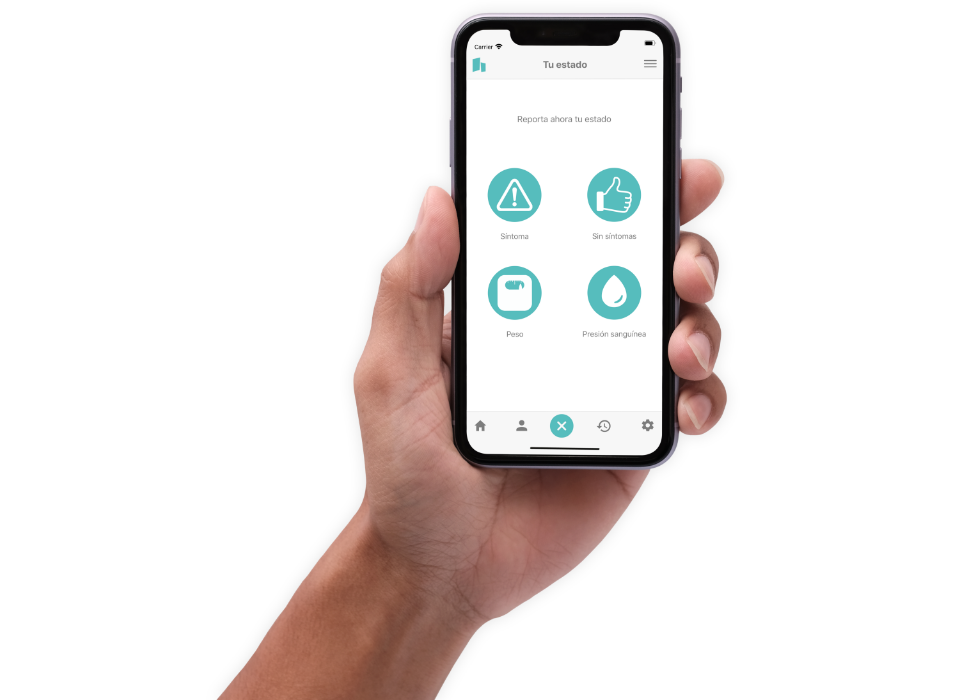
Intelligent System to predict adverse effects in cancer patients
Using artificial intelligence, we have created an algorithmic based technology that is the basis of Step, a tool that can be easily implemented in any hospital environment and in all kinds of clinical trials.
What we propose with Step is:
- To anticipate to complications.
- To predict what is going to happen and to be able to make quick and correct decisions.
- To increase the life expectancy and quality of life of patients.
- To optimize hospital resources and pharmaceutical investment.
- To improve medical outcomes.
- To take a further step in the progress of medicine and global health.
A new innovative, functional, versatile
and very simple tool
Step is a cloud-based AI system that facilitates systematic remote monitoring of a patient while learning from each patient to analyze real-world population data. This GDPR-compliant technology is highly scalable. Its central model of anonymized aggregate data opens up opportunities to evaluate the effectiveness of treatments and their results in a real, long-term environment. It also provides the ability to generate different prediction models.
This means that the STEP technology platform handles a large volume of structured cancer patient data. AI algorithms are the intelligent module that detects and recognizes common patterns in similar cancer patients to specifically predict potential complications. In this way, STEP improves and customizes the follow-up of new patients. It allows to adjust the follow-up to detect possible complications so that they can be treated before they get worse, reducing their impact during or after treatments, improving results and reducing costs.
The innovations brings a great advantage for the improvement of the daily work of hospitals and pharmaceutical laboratories:

Patient-reported data
With Step, patients can help by answering questionnaires or reporting symptoms at any time in the application, which stores and integrates individual responses with clinical information and is capable of analyzing them as a whole.

An automatic, fast and efficient priorization process
Step automatically evaluates patient priorities for care based on the patient’s self-reported symptoms. Thanks to its algorithm, this process is fast and efficient. The goal is to help identify patients at risk and help make decisions much earlier and better.

Generating new knowledge of the real world
Patient-reported data combined with clinical data open up new and relevant opportunities to assess the safety and efficacy of long-term treatments in a real-world setting. This allows the development of new and better opportunities to treat cancer.

A more agile and economical way of working
In the case of the hospital sector, once integrated into the care circuit, Step relieves the resources of the centre, for example by reducing patient consultation time, optimising the time of doctors and nurses and reducing significantly the associated cost per patient and the costs of obtaining real-world patient data.
A global system that can be obtained by independent modules
Step is a global tool, but thanks to its versatility it is also possible to obtain Step for specific services based on the objective.
These are the three functional modules of Step:
Step Monitoring
Symptom tracking system
Step Monitoring is a medical device software that collects data directly from the patients, without any intermediaries. Patients answer questionnaires and report symptoms at any time through an intuitive and simple to use app.
The main advantages that Step Monitoring brings to the usual procedure of collecting patient data (in research projects or clinical practice) are the proactive management of symptoms which, at the same time, facilitates the automatic detection and prioritization of patients based on the deterioration of their symptoms, allowing health care professionals to act quickly and appropriately without the need to increase resources.
Step Analysis
Descriptive analysis at the population level
Step Analysis is a descriptive population-level analysis tool in a real world setting, which shows the evolution of patients with similar profiles, and which represents the information visually and intuitively through interactive graphics.
Step Analysis learns, in real time, from the entire population through the generation of aggregated data that complies with European data protection regulations. Thanks to Step Analysis, new knowledge is generated about evolution, quality of life and adverse events in a real setting, allowing the optimization of procedures and improving medical results at a global level.
Step Predictive
Adverse Effects Calculator
Step Predictive is a medical software device. The first predictive artificial intelligence tool created from Step Analysis aggregated data. Its function is to predict the risk of developing serious adverse events based on the selected treatment.
With Step Predictive, clinicians improve outcomes by reducing decision-making uncertainty and adjusting the follow-up of each patient to prevent complications.
Request DEMO
We have designed Step working closely with hospitals and pharmaceutical laboratories, with doctors, with nurses and researchers, with patients…
We know that every day ideas arise to improve the outcomes and quality of life for people with cancer and chronic diseases in general. Step is the achievement of that idea.
Do you want to see how Step really works? Request your demo by filling out the form below.

